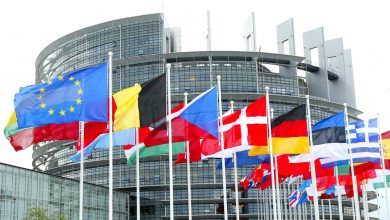Member States Run The EU. They Have Failed.

Member States are the undisputed leaders of the European Union. They are the ones who in effect authored and voted for the current institutional setup, which greatly favours them. It is Member States that organise summit after summit to take the truly important decisions about EU governance. With this leadership also comes accountability, however. As the EU looks set to be the big loser of the political ripple effects of the coronavirus global pandemic, it is time we asked who really dropped the ball. Member States had the health competences and the budgetary clout to see the Union through the crisis. And they are the ones who have failed.
When Did Things Get This Bad?
When we say Member States are the undisputed leaders of the EU, some readers might be taken by surprise. After all, so much political campaigning in Europe today is based on scapegoating an “unelected bureaucracy” which is allegedly over-mighty in its interference with national politics. However, that is not what the actual practice of politics in Europe tells us. Even aside the very extensive powers given to the Council by the Treaties themselves, customs have evolved considerably. Consider this: between 1961 and 1973, only six European summits took place. The Treaty of Lisbon contains provisions for four meetings a year. Now, the European Council meets about twice that number every year, sometimes more.
This is a momentous change, so it would be sensible to ask what brought it about. The answer is the series of blows that hit the continent over the past decade. The Great Recession of 2008, the Euro debt crisis of 2012, the Crimean crisis in 2014 and the refugee crisis in 2015, and finally the Brexit negotiations. The latter negotiations are an excellent example of what we mean: the Commission received a mandate from the 27 Member States to conduct negotiations with the UK, but the buck always eventually stopped with national capitals. They were the only ones who could authorise an extension, for example.
Now, the situation here described need not necessarily be bad. Europe has evolved in the direction of a permanent diplomatic conference, one that never disbands but carries on indefinitely and really does try to work in concert. It’s a political development without precedent in history. Diplomacy by conference also has some inherent strengths: the ability to cut deals on a face-to-face basis and the trust and familiarity developed by its participants over time, amongst others.
However, it also has glaring weaknesses. The horse-trading behind closed doors hampers political legitimacy, and institution-building is inherently weakened by the resurgence of national diplomacy, which risks turning Europe from a power in its own right into a mere forum. Moreover, European nations specifically suffer from weaknesses which are unique to them. Those weaknesses have led to widespread mismanagement of European policies. The ongoing coronavirus pandemic has laid them bare for all the world to see, and it’s a truly ugly spectacle.

Chronic And Acute Mismanagement
A Reuters exclusive has revealed just how painfully incompetent Member States have been when exercising their share of healthcare competences. Already in early February, the European Commission was warning Member States that the storm was coming – and was inquiring into their preparations. Member States did not heed the warning and reported to the Commission that national healthcare systems were in an advanced state of readiness. No need to alter procedures or place orders for more ventilators, masks, and other essential supplies. Everything was under control.
And then it wasn’t. As the pandemic sucker-punched the EU, Member States threw themselves headlong into a shambolic race to secure masks and stick to their national stockpiles. It took weeks of diplomatic work for the Commission to enact joint stockpiles, joint industrial production, and to keep transfers of medical equipment going. The measures taken by the Commission and the ECB are impressive – you can read more on them here – but where the supranational institutions have acted well, Member States have failed.
The spectacle of unpreparedness didn’t stop with the question of coordination. What followed was an increasingly incoherent discussion over what financial tools were best suited to address the coronavirus-triggered economic recession. In this, all sides displayed exceeding political myopia.
Southern States have grounded their argument for coronabonds (which is otherwise perfectly reasonable) with bizarre and rather grotesque attempts at blackmail. This is Italy did when it threatened not to make use of the European Stability Mechanism if bonds were rejected – even though it is the country that would currently benefit from the ESM the most. Nordic countries, meanwhile, have shown their complete inability to grasp the magnitude of the situation, with the Netherlands in particular actively looking for a solution that would require the smallest amount of change to the EU as it stands. In other words, a band-aid.
The problem with band-aids is that deep wounds remain open below. This is the same approach the EU undertook to address the 2012 debt crisis. Change the least possible amount of things in such a way that you can barely make it through the crisis. This is extremely poor risk management: the risk of doing too much is much smaller than the risk of doing too little. The Great Recession has taken a full decade to play out across the West. It has poisoned the wells of our political debate, encouraged radicalisation, lowered social trust, and some Western countries are still to return to pre-2008 GDP levels.
The coronavirus crisis will be worse. The numbers clearly show that it is the worst economic crisis since 1929, and it’s only just getting started. It is completely naive to believe it will not have a similar impact. And it is completely reckless to assume we can just scrape by with an ad-hoc, barely workable, fundamentally timid response. And yet, eight years after the Euro debt crisis, it’s happening again.

Active Leadership Avoidance
In the summer of 2019, we wrote an article dissecting the truly shambolic spectacle of the European nominations which followed the elections. Re-reading the closing paragraph to that article almost twelve months on is peculiar:
“The European Union’s real problem is not in the Treaties or their implementation or even in the apparent and increased fragmentation of its electorate. The real problem is that its policy elites are not ready to rule the continent. After the Great Recession and the 2012 Eurozone crisis, one wonders what other near-apocalyptic scenario will be required to snap European politics out of its sclerotic complacency.”
It is perhaps an example of supreme irony at work that the question received a prompt answer. Apparently, we can scratch global pandemic off the list of crises capable of waking European leaders to the reality of the dangerous 21st Century. But it’s also useful to illuminate what the problem is: there is no reason why even a Europe of nations had to mismanage coronavirus so badly.
There is no magic barrier protecting the European institutions from reforms. Proposals that come to mind would be concentrating emergency healthcare competences at the EU level, giving the EU a budget worth of its status as a regional great power, or even just taking the Commission’s warnings about a pandemic seriously. All these things are easily doable with political will. Sadly, that’s when we get to the hard part.
Can we move forward?
The core problem is that European policy elites do not take the EU seriously. They lack the vision, the determination and the ambition to make use of its great potential. They are content with its market and financial achievements, and – in the words of economic historian Adam Tooze – prefer to argue endlessly over milk quotas as opposed to dealing with high politics. Of course, just because our leaders are uninterested in high politics, that doesn’t mean high politics are uninterested in them.
If anything, in the present century, questions of high politics are multiplying. Territorial defence is back on the agenda, and so is war on European soil, along with problems of nuclear security. The United States can no longer be assumed to have our best interests in mind. The continent needs a revamp of its infrastructure, has to worry about Russian ships in the melting Arctic, and peace in Ireland. And in all of this, climate change is coming.
Coronavirus has been very educational in showing just how unprepared we are to deal with existential crises. A virus cannot be argued away or swept under the rug. No amount of wishful thinking will make it disappear. It does not care for our leadership’s intense desire to keep Europe frozen in the 1990s forever, or to remain on the benches while letting others be the big players.
For all the doom and gloom in this article, it must be made clear that we can pull through these crises. The EU has a high technological base, a genuinely cutting-edge single market, a solid industry, and our societies are relatively peaceful and trusting. But we cannot get the job done if Member States refuse to rise up to the challenge. They must start taking Europe seriously – or leave the room for other institutional actors who will.





